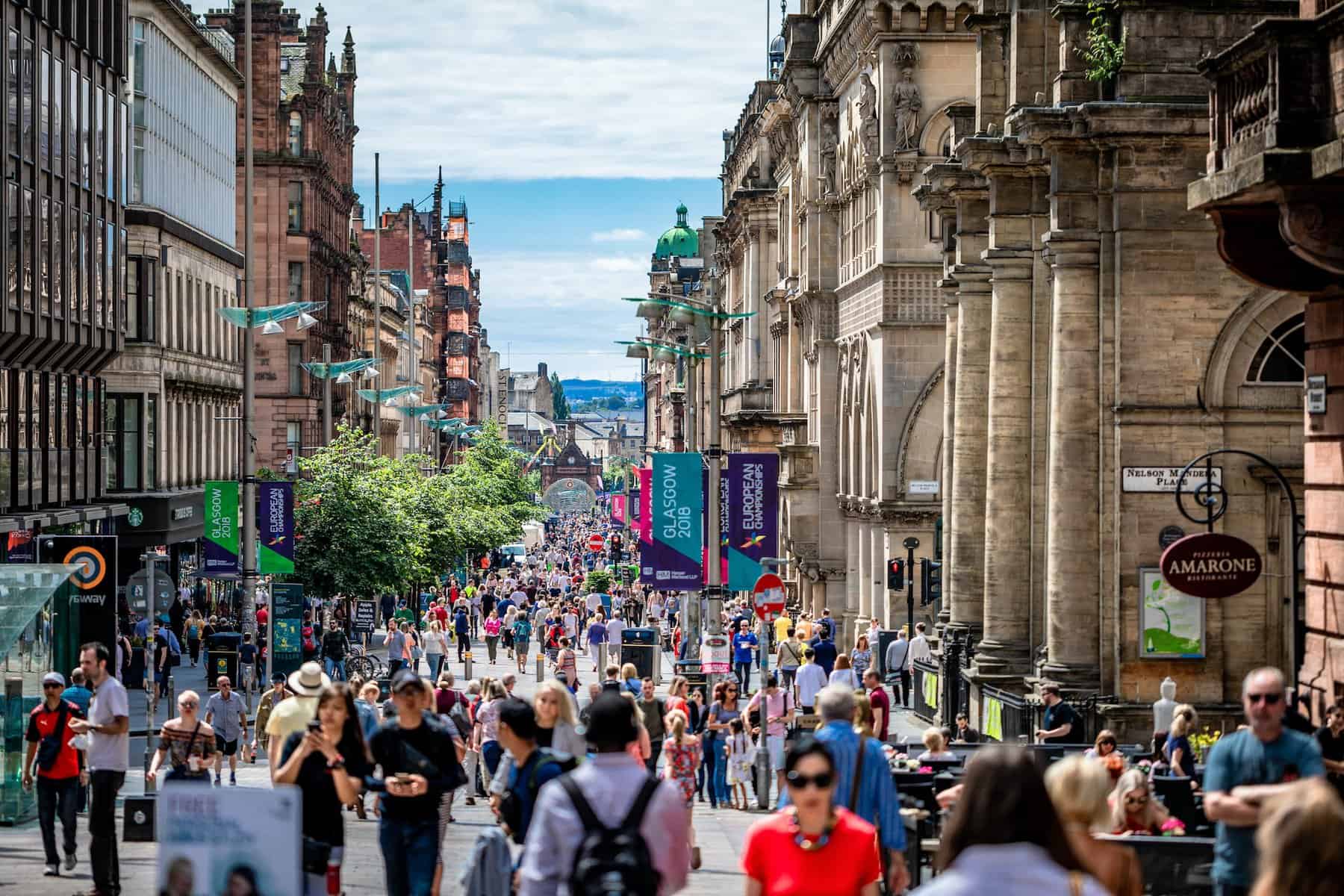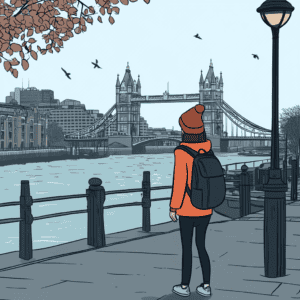Business in the Front, Party in the Back: What is the University of Glasgow Like?

- Originally published
- Last updated on September 1st, 2023 at 10:21 am
Table of Contents
With powerhouse scholarship, dozens of lecture theatres, a short walk to a vibrant city centre chock full of nightlife, and a beautiful campus, this uni packs a punch. But what is the University of Glasgow like? Well, it might not be Scotland’s capital, but the University of Glasgow revolves around its biggest city: Glasgow. Depending on who you ask, that could be a good thing or a bad thing. If you’re a hipster, art student, path-forger, partier, or just a cost-conscious student who wants a global top-100 degree on your wall, you may have just found your perfect fit.
First, if you don’t know the basics of what college in Scotland is all about, dive in. Then compare the costs of Scotland’s universities to make sure you know what you’re getting into. Ready to compare Scottish schools? Look at St. Andrews or the University of Edinburgh.
University of Glasgow Basics
Degrees: BAcc, BSc, BEng, Mang, MA, MSci, BA, MA(SocSci), BDS, MDTechEd, MEduc, BFin, MBChB, BMus, LLB, BVMS
Majors: 120 programs listed, though there’s some overlap, like a music Bus or MA (undergraduate) degree, and Singapore and UESTC programs in partnership with Asian universities that aren’t study courses by themselves. The spread is still broad, and you’ll find everything from software engineering to Scottish literature, veterinary biosciences, medicine, dentistry, Gaelic, genetics, and ancient history represented.
Location: Glasgow, Lanarkshire, Scotland
Cost for out-of-EU: £23,520 for arts and humanities, £27,930 in sciences, and £53,460 for medical, veterinary, and life sciences clinician programs
On-campus housing cost: £4,461 to £8,321 for the academic year
FAFSA Funds: Yes
Abroad from abroad: Yes. Programs range from 2 years to an academic year, and work opportunities abroad can also help students internationalize their educations. You’re limited by subject area and language capabilities. For instance, Classics students have no opportunities in Greece and just two in Italy (Roman and Genoa). They can, however, visit other countries to explore their degree areas. Students with broadly popular courses of study have more choices across Asia, Europe, the Americas, and Oceania.
Student body: 35,525 total students, 16, 740 from outside the UK (that’s 47%)
Five adjectives: Livable, friendly, unpretentious, social, local
Living in Glasgow
If you come from a city without four distinct seasons, prepare for Glasgow. You’ll get them — often in a single day. Windy Scotland weather is unpredictable everywhere, but this wet, west coast city gets the brunt of wintery rain from the North Sea. Historic apartments can be chilly and damp all the time. Escape the blast at the museums, many of which are free. Or hit up vegetarian eateries in this affordable, foodie town. Bask in the warmth of a super cheap quinoa bowl and the cozy yellow light that you’ll need to turn on to study around 4:00 every afternoon in the winter. If you live close by, the single-ring subway system can keep you warm and dry as you get around this city of 635,000 people (think: Washington, D.C.).
Glasgow is Edinburgh’s more livable cousin, a city that’s very affordable, and with plenty of green space. It has more of a reputation for shopping and partying than the capital, which exudes “culture” vibes instead.
Bikers will find they can get around just fine, with more separate lanes getting built all the time. Glasgow spreads out more than Edinburgh, and the university itself lies outside the city center. It’s a 40-minute walk from George Square in the center of the city.
Glasgow urban planners hope to develop multiple “15-minute-city” hubs where services, schools, and a high street are available to residents further from the city center. So explore the popular West End where students live. Grab a Munchy Box full of chips, kabobs, and onion rings. Stroll Byer’s Street (steps away from some student accommodation) for popular pubs like Tennent’s Bar for a macaroni and cheese sandwich or the Record Factory for an underground dance club and outdoor beer garden.
In Victorian Glasgow, you’ll find fewer tourists and selfie opportunities than in medieval Edinburgh. In Glasgow, the spaces local students hang out are full of friendly faces you’ll likely get to know, not strangers on their way through.
Is Glasgow Safe for Students?
Glasgow is less international than Edinburgh, and often considered more “authentic.” Part of that stereotype is that Glasgow is sketchier and less safe than Edinburgh. The reality is that it is just less Instagrammable. But students we talked to said they see Glasgow as “loud” but not unsafe. Glasgow is where Scottish locals come to play and party, to cram into the subway on Friday nights, and to offer helpful advice at every turn, but not to target outsiders.
One of the taglines of the city is “People make Glasgow.” It feels true. Glasgow is more friendly, warm, and open than Edinburgh. It is more student-friendly. The university is very international, so being in this environment, Glasgow feels very welcoming to different people, races, and sexualities.
Glasgow suffers from the distinction of having Scotland’s highest violent crime rate. Yet with 10 murders in 2021, it’s oodles safer than comparably-sized American cities (Washington, D.C. saw 221 murders that year). Further, its violent crime was cut in half between 2002 and 2015 as Glaswegians worked to stem youth gangs, poverty, and social isolation.
Up and Coming Glasgow
As its reputation for street crime fades, Glasgow is making itself known as an academic, technological, health, and banking hub. It ranks 5th in the UK for foreign direct investment, turning the heads of companies like DuPont and Barclays who recently invested in new facilities there.
But hardly known as a buttoned-up corporate center, Glasgow has a thriving arts scene—Glasgow School of Art students contribute to the atmosphere of youthful experimentation. Walk Mural Trail for renowned street artists or hit up some venues during Celtic Connections, the midwinter music festival showcasing not only Scottish fiddlers, but a litany of world music.
I think Edinburgh feels posh. But the Glasgow art scene has more to offer students. There are social enterprises that support the arts, there are opportunities to get involved. In an Edinburgh gallery you may not have the same opportunity.
Glasgow’s big city party vibes aren’t for everyone, and the big city delivers with small venues, a huge music scene, plays, comedy, and plenty of spaces for laid-back students to find their own way.
Studying in Scotland at the University of Glasgow Campus
Glasgow’s primary Gothic Revival building is an imposing edifice on a broad thoroughfare, complete with a sprawling lawn and wrought iron fencing. The library, a lanky modern grey building, lies across the street and a grassy hill. The student center, full of services from the career center to a café, is also at this student hub. You’ll also find an alternative to the library in the Round Reading Room, where you can settle into a quiet nook to read or use a computer. One (yes, of two) student unions is on the same block, where, sure, there’s another library, but there are also nine bars. In short: while the suburban vibes of the buildings offer students plenty of space to spread out, the university core occupies a very navigable little square of Glasgow.
Quadrangles of sandstone house many academic departments and give students grassy courtyards to soak in the sun on rare days when it’s shining. They also lead back out to other campus buildings through a columned passageway called the “cloisters,” so picturesque it’s been the setting for t.v. and film shoots from Outlander to Cloud Atlas.
Not every building is movie-worthy. A mix of square classroom buildings nudged into this expanded campus where the university moved from Glasgow’s High Street in the 1870s. Yet your path to classrooms might be lined with shortcuts full of wildflowers or a temporary art installation, and you’ll glimpse the whole city from the top of Gilmorehill where the university still stands (bricks from the older campus buildings were moved individually).
Since the original Papal Bull that founded Glasgow came in 1451, the university if officially the 4th oldest English-speaking university in the world, and along with Aberdeen, Edinburgh, and St. Andrew’s, it’s an “ancient” university. That means undergraduate honors degrees are called “masters” and that there’s a heaping of pipe music at graduation.
Student Life
But there’s plenty to enjoy before you graduate. With over 300 clubs, you’re sure to find your people. Try the Adam Smith Economics Society (a nod to the renown of Glasgow alumni), the American and British Society where you can analyze your biggest culture shocks, Quidditch, Minecraft, Neurodiversity, or Psychedelic Research. There’s no shortage of interests covered.
LGBTQIA+ students can explore Glasgow’s long queer history, pop into its independent queer bookstore, or meet up for karaoke and pre-club drinks at Delmonica’s. The university helps students get their footing, too, with a chaplain assigned to the LGBTQIA+ community, peer support, and office hours for drop-in support.
The West End’s a great place for students. It’s basically a student city with everything you need right here. There is something for everyone’s vibe. Cafés, food, independent shops, vintage.
Student Accommodation
Housing options are plentiful, including university-owned halls and private halls. Private halls are a Scottish concept: they’re basically shared student accommodation. But rather than the university owning and managing them, they’re available privately. You’ll need to find them, apply, and live by their rules. In spite of the glut of options, most students move out of student accommodation (both university-owned and private) after their first year in order to reap the benefits of living alone, enjoying a kitchen, getting a pet, and living with the apartment-mates of their choice.
Large accommodations are easier to get into, and loom large in freshers’ imaginations. Murano rooms sport an American dorm vibe of single beds, veneer desks, wardrobes, and a sink. They also come with a reputation for partying, which can be a social benefit or an academic liability, depending in your point of view. A fun UK bonus for American students is that student accommodation often comes with a weekly cleaning service. A less fun wake-up call is that student accommodation, even when university-owned, can be a mile away from the main campus. At this biggest freshman dorm at Glasgow, you’ll find both.
But don’t worry too much: there’s a shuttle bus that can get you to class and to the city center. Choices and prices vary, like American universities. Each building has its own reputation, and you won’t necessarily get to know yours until you’re there. There’s also student housing just a couple minutes from the main university buildings, for students who value rolling out of bed and into their classes.
Private accommodation can give you more features, but like university-owned accommodation, you’ll never know who the flatmates sharing your kitchen will be, and you’ll have to seek out and compare accommodations on your own. You may pay bills in private accommodation, and amenities can cost more.
How Academics Are Unique at the University of Glasgow
Rankings and Prestige
Russell Group researchers rejoice! This research-heavy, global-top-100 university doesn’t scrimp on academic power. They rank in the top 100 at the Time and US News. Arts and humanities, cardiovascular systems, cell biology, clinical medicine, microbiology, physics, infectious disease, neuroscience, optics, oncology, and public health all rank in the top 100 in the world.
The University of Glasgow publishes subject-specific league tables for UK departments, boasting of their place as, say, third in the UK in Art History. What does that really mean? Glasgow is huge, and its research prowess can readily eat up smaller schools. With a gargantuan library and top-notch faculty, its ratings are always high. And it’s even a place about Edinburgh (11th vs. 12th) for overall teaching in all subjects. While it can’t beat the #1 St. Andrews student satisfaction rates, its students walk away some of the most satisfied in the UK with the teaching they got.
Maybe it’s because size matters. That art history student can benefit from an on-campus part gallery for practical training, plus partnerships with well-known institutions from the Smithsonian to the Prado Museum in Madrid.
Flexible Degrees for a Self-Styled Education
Another way for students to get exactly what they want out of the University of Glasgow experience is the “flexible degree” system. Think of it like a multi-subject American degree with none of the “required” prerequisite categories.
Scottish people equate the four ancient universities with quality. The differences lie in which city you prefer and there’s no right answer.
Flexible degrees mean the 4-year honors program includes study in multiple fields of their choice, Scottish style. Students typically study three subjects in their first year. Even in 3rd and 4th years, students can stick with 2 subjects and graduate with a combined joint honor’s degree.
Unlike many UK universities, you won’t even have to choose your subjects on your application. A social science student, for example, would choose three subjects first year, but can choose arts or science topics, too. Their second year, they can progress with two of those three subjects, moving to a higher level. And they can add a new subject, too. In their third year, students will stick with a single or joint subject and continue until graduation. They can graduate without honors after three years or stay through their 4th year, get an honor’s degree, and enjoy a study abroad, work, or deeper subject experience leading to a graduate school application.
Take that art history student: they can combine the history of art with business management or computer science, or even digital media. They can spend their third year at a partner institution for a job placement at a museum, learning both management and art history.
The program also offers a unique way to both combine subjects and stick with a focus. A social science student may choose to take Political Science, History, Sociology, and Urban Studies. That gives them both breadth and depth in an area they won’t be able to carve out at many other schools.
Flexible degrees were part of the reason why I chose to attend Glasgow. The subject you apply for gives you the system to work all the paths you could choose, like the arts pathway. You’ll take two modules apart from your subject area. At the end of year two you can change to either degree you’ve done for both first and second years, or use both toward a joint degree.
What You Need to Apply
Use UCAS (the UK’s application portal) or use the US Common App. Professional areas like medicine, law, and veterinary sciences will require a UCAS application. International students have until June 30 to apply for fall admission, but since January 31 is the UK deadline, it makes sense that spots in the program fill up early and applicants should act as early as possible. For medicine, veterinary, and dentistry, applications are due October 15 the year before you plan to start.
In one social science degree program, IB grades required run from 36 to 32, with subject experience. For an advanced entry program (earn that honors degree in three total years), you’ll need 38 points.
Students can submit GPAs over 3.5, SATs of 1280, ACTs of 27, and 2 AP exams with a score of 4 or 5. No standardized tests? Submit 3 AP scores of 4 or 5. As with other UCAS apps, you’ll also submit a personal statement and a letter of recommendation.
Related Posts

Jessica Share
Jessica is the writer, Ph.D., and mom-of-an-abroad-student-in-the-UK at the helm of College Abroad Guides. When she's not asking college students where the coolest place to hang out in their city is, she's figuring out how she can make $60 imported Greek oregano potato chips and £50 British bacon potato chips appear on her doorstep for the cost of a local bag of Lay's.





